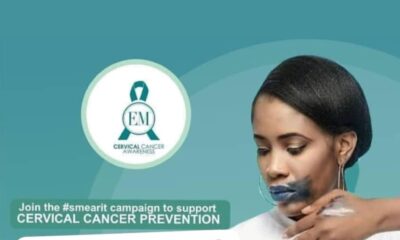Features
#StopHPVForHer: Dr Stephanie Egboh Explains Why Cervical Cancer Screening Matters for Every Woman
Dr Stephanie Egboh of Healthtracka shares how a simple 10-minute Pap smear and HPV vaccination can protect millions of women from cervical cancer.

What if the difference between life and loss was just one test — a simple Pap smear that takes less than 10 minutes? Across Nigeria, many women are still unaware of the link between HPV and cervical cancer, even though screening and vaccination could save countless lives. That’s why BellaNaija, through the #StopHPVForHer campaign, is leading meaningful conversations about awareness, prevention, and the importance of protecting the next generation of girls through vaccination and early screening.
As part of the campaign, we spoke with Dr Stephanie Egboh, Medical Officer at Healthtracka, a digital health platform offering at-home lab testing and digital results across Nigeria and other parts of Africa. Through her work, Dr Egboh is showing that cervical cancer screening can be simple, accessible, and powered by innovation.
In our conversation, she explains how HPV infection develops in the body, why screening remains essential even after vaccination, and how technology is helping women stay one step ahead of cervical cancer.
Dr. Stephanie, we know HPV can cause changes in cervical cells over time. Can you explain what happens in the body as the infection progresses toward cancer?
When someone gets infected with the high-risk types of HPV, the virus can enter the cells of the cervix(mouth of the womb) and gradually cause small changes in the DNA of these cells. In some cases, the immune system clears the infection naturally within a year or two. But if the infection persists, those abnormal cells can multiply and gradually turn into precancerous cells and then cancerous lesions over several years. It usually takes years for these changes to occur.
HPV-related cancers, especially cervical cancer, remain a major concern in Nigeria. Can you walk us through the process and importance of getting a Pap smear?
In Nigeria, where cervical cancer remains a major cause of cancer-related deaths, increasing awareness and access to Pap smears can save thousands of lives.
A Pap smear is one of the most effective tools for early detection and prevention because, if detected early, better treatment outcomes are certain. A Pap smear is a simple test that looks for abnormal cells in the cervix before they turn into cancer.
During the procedure, you lie on your back, a speculum is inserted into the vagina to properly visualise the cervix, a brush is inserted into the cervix to get samples that would be sent to the lab for screening. The procedure can be uncomfortable, and occasionally, slight bleeding might occur after.
If a woman received the HPV vaccine today, how often should she still get screened for cervical cancer?
Even after vaccination, screening remains very important. The HPV vaccine protects against most but not all the types of HPV. Women should still follow the normal screening guidelines, starting Pap smears or HPV tests from age 25, and repeating every 3 to 5 years.
There are several screening methods, such as the Pap smear, HPV DNA test, and VIA. How can women decide which one is best for them?
Each screening method has its own advantages and disadvantages; thus, it is always best to seek professional help to guide you on which method best suits you
- A Pap smear looks for abnormal cells in the cervix
- The HPV DNA test looks for the virus itself
- VIA (Visual Inspection with Acetic acid) looks for changes in the cervix directly. It is a cheaper option and is useful in community or rural settings.
The best test depends on availability, cost, and a woman’s age or risk factors. The important thing is not which method, but that the screening actually happens and at the right time.
The one-dose HPV vaccine is now available in Nigeria. How effective is it compared to older multi-dose schedules, and what should women know about the protection it offers?
Studies have shown that a single dose provides the same strong, long-lasting protection as the older two- or three-dose schedules, especially for girls aged 9–14. This makes it easier and more affordable to protect millions of girls across Nigeria. The vaccine protects against the HPV types that cause about 70–90% of cervical cancers, and the protection is for life
Beyond vaccination and screening, what lifestyle or health habits can women adopt to reduce their risk of cervical cancer?
Beyond vaccination and screening, women can reduce risk by:
- Practicing safe sex and limiting multiple partners
- Paying attention to the body to be able to pick up symptoms early, before they advance
- Avoiding smoking (which weakens the immune system and increases HPV persistence)
- Maintaining good nutrition and a healthy immune system
- Getting prompt treatment for any abnormal test results
From your experience, what are the common mistakes women make before or after a Pap smear that could affect their results or delay early detection?
Common issues include:
- Scheduling a Pap smear during menstruation
- Using vaginal creams
- Douching, or having sex within 48 hours before the test.
After the test, some women forget to collect their results or follow up on abnormal findings.
Technology is transforming healthcare. How can digital tools help women track vaccinations, schedule screenings, and stay on top of follow-up care?
Digital health platforms are transforming how women manage their health. Apps and SMS reminders can help track HPV vaccinations, schedule Pap smears, and send follow-up alerts. At Healthtracka, for example, we use telemedicine and mobile tools to help women access lab testing and follow-up care from home. Technology bridges the gap, turning awareness into action and ensuring no woman is left behind.























